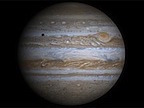You are here
Appendix E
The following document is an abridged account of the major dissertation, commonly known as Principles of Philosophy, of the enigmatic ancient philosopher Fleegello. Whether Fleegello was in fact a person, or merely a collective label for a particular philosophic school, is still hotly debated, but the weight of evidence now seems to favor the former view.
Assuming Fleegello was a single individual, scholars believe that he continually revised the Principles throughout his adult life. The last known version is printed here. It includes notable changes to Fleegello’s earlier thoughts about multi-time quantum theory (see section 2.3). There is evidence that Fleegello was trained as a physicist (known as a natural philosopher at the time), but was insecure in that role, and instead considered himself primarily an amateur general philosopher. While he helped clarify the meaning of the multi-time wavefunction, he failed to derive associated equations of motion.
The updated text also incorporates changes in the use of personal pronouns, probably to make the content more overtly inclusive. In particular, Fleegello chose to adopt explicitly gender-neutal pronouns equivalent to the modern xe/xem/xyr/xyrs when referring to individuals of unspecified or ambiguous gender. He continued to use gender-specific pronouns when gender identification was clear, and it/it/its/its when gender was lacking or deemed irrelevant.
The editors would like to acknowledge the numerous individuals and groups that have contributed to the Otkin-Utalk Project, in its efforts to reconstruct the threads of our octan philosophical/religious heritage during the Early Machine Age. In particular, we thank our colleagues at the Institute of Ancient History (IAH) for releasing a wealth of critical original documents only recently recovered from deep ice storage vaults at archeological dig site #13 on Jopian Moon-3. The current work draws heavily on this new IAH material.
Editorial comments and discussions are scattered liberally throughout the text. These are enclosed in brackets to distinguish them from the primary content. The reader is cautioned that much of the original material is still fragmentary and incomplete, and subject to serious translation and interpretation errors. To access the unabridged version of this work, please refer to library path PHL/HST/MCH/ERL/FLEE/KN0.
(Abridged Version)
Fleegello, Jope Zuul +353?
